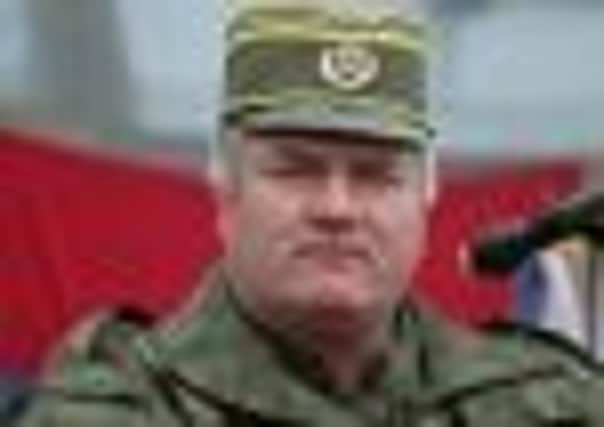Warlord’s capture ‘should bring closure over Serb war crimes’


Mladic, who is accused of ordering the genocidal massacre of 8,000 Bosnian Muslim men and boys, was arrested yesterday after 16 years on the run.
The 69-year-old was indicted for war crimes including genocide in 1995 and became Europe’s most wanted man following the 2008 arrest of Bosnian Serb leader Radovan Karadzic, who is currently awaiting trial before the International Criminal Tribunal for the former Yugoslavia (ICTY) at The Hague.
Advertisement
Hide AdAdvertisement
Hide AdThe wartime Bosnian Serb military chief’s days as a fugitive were thought to be numbered ever since Serbian security forces captured Karadzic on July 21, 2008, in Belgrade.
Yesterday Serbia's president Boris Tadic announced that Mladic was in custody. Yorkshire MP and former Minister to the Balkans Denis Macshane said it was an open secret that the warlord had been protected by ultra- nationalist security forces in the country. He said yesterday that the arrest should bring closure to Serb war crimes and urged the country to now support the independence of Kosovo.
Known for personally leading his troops in the 1995 Serb onslaught against the UN-protected enclave of Srebrenica – where thousands of Muslim men and boys were killed “ Mladic was indicted for genocide against the Bosnian town’s population.
Just hours before the massacre, he was said to have handed out sweets to Muslim children rounded up at the town's square and assured them that all would be fine – even patting one child on the head. That sinister image is forever imprinted in the minds of Srebrenica survivors.
Advertisement
Hide AdAdvertisement
Hide AdBorn on March 12, 1942, in the south-eastern Bosnian village of Bozinovci, Mladic graduated from Belgrade’s prestigious military academy and joined the Yugoslav Communists in 1965.
Embarking on an army career when Yugoslavia was a six-state federation, Mladic rose steadily through the military ranks, making general before the country's break-up in 1991.
At the start of the Balkans bloodbath, he was in Croatia leading Yugoslav troops in Knin and was believed to have played a crucial role in the army bombardment of the coastal city of Zadar.
A year later, he assumed command of the Yugoslav Army's 2nd Military District, which effectively became the Bosnian Serb army.
Advertisement
Hide AdAdvertisement
Hide AdAppointed in 1992 by Karadzic, Mladic led the Bosnian Serb army until the Dayton accords brought peace to Bosnia in 1995.
His ruthlessness was legendary: "Burn their brains" he once bellowed as his men pounded Sarajevo with artillery fire. Such was his arrogance that he even nicknamed himself God, and kept goats which he was said to have named after Western leaders he despised.
Obsessed with his nation’s history, Mladic saw Bosnia's war – when more than 100,000 people were killed and another 1.8 million displaced – as a chance for revenge against 500 years of Turkish-Ottoman occupation of Serbia. He viewed Bosnian Muslims as Turks and called them that as an insult. Convinced of the power of his army, he was known for telling his soldiers: “When I give you guarantees, it’s as if they are given by God.”
Once, asking air traffic control to clear the way for his helicopter to land, he declared: “Here speaks Ratko Mladic – the Serbian God.”
Advertisement
Hide AdAdvertisement
Hide AdThe US government had offered five million dollars for information leading to Mladic's arrest or conviction in any country. Evading arrest, he began his fugitive years in Han Pijesak, a military compound in eastern Bosnia built for former Yugoslav communist leader Josip Broz Tito and designed to withstand a nuclear attack.
With his wife Bosa, Mladic settled down to imposed domesticity, passing the time caring for bees and goats. Surrounded by security guards, he occasionally ventured out of the dense pine forest to mark events such the anniversary of the Bosnian Serb army and St Vitus Day, a religious festival marking the 1389 Serb defeat by the Turks at Kosovo. Mladic then moved with family into a posh suburban villa in the then Yugoslav capital, Belgrade before going underground in 2002.